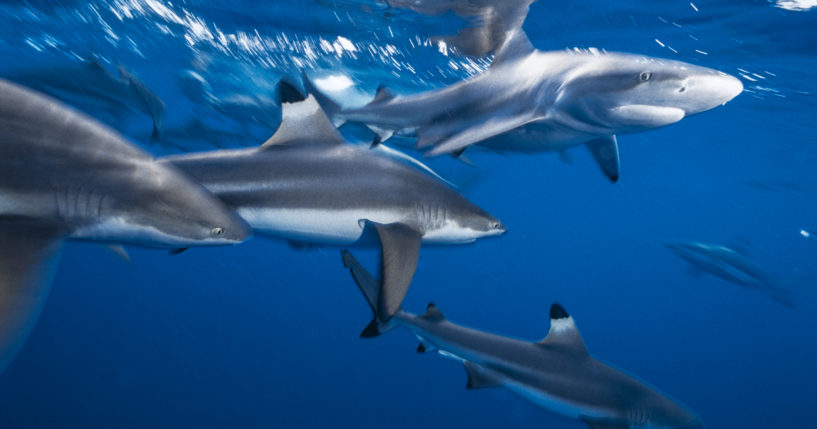
A New Device May Prevent The Hooking Of Millions Of Sharks
<img src=”https://storage.googleapis.com/prod-zenger-storage/image/20221121/feat_ff43f3ca-981b-4e55-86c7-9e7ec1698828.jpg” alt=”FILE – Blacktip reef sharks (Carcharhinus melanopterus) evolving under the surface in the lagoon of Moorea, January 24, 2021, French Polynesia, Pacific Ocean. PHOTO BY ALEXIS ROSENFELD/GETTY IMAGES“>
With the use of a novel electrically pulsed device, millions of sharks could be prevented from being trapped on fishing hooks.
SharkGuard is a gadget that attaches to fishing longlines and generates an electrical field around a baited hook. Sharks and rays pick up these signals with their electroreceptors and are discouraged from biting.
Tests have shown that it can reduce the bycatch of these animals by 91 percent for sharks and 71 percent for rays. The inventors say this technology could reverse the dramatic decline of endangered sharks around the world.
“The main implication is that commercial longline fishing may continue, but it won’t always necessarily result in the mass bycatch of sharks and rays,” said Dr. Robert Enever of the conservation company Fishtek Marine.
“This is important in balancing the needs of the fishers with the needs of the environment and contributes to national and international biodiversity commitments for long-term sustainability.”
Longline fishing is the number one threat for sharks living in the open ocean, with more than 20 million pelagic sharks caught every year by fishers looking for tuna and other species.
Enever and his colleagues thought that shark deterrents that worked for protecting scuba divers and surfers could also be applied to tuna fisheries to protect sharks from bycatch.
The team ran sea trials of their device in July and August 2021 in southern France and published their results in the journal Current Biology.
Two fishing vessels fished 22 longlines on 11 separate trips, deploying a total of more than 18,000 hooks. The researchers found that SharkGuard hooks significantly reduced the number of blue sharks and pelagic stingrays caught in comparison to standard control hooks.
The catch rate of these species per unit effort dropped by 91 percent and 71 percent for sharks and rays, respectively, whereas catch rates of bluefin tuna were not significantly influenced by the presence of SharkGuard on the hook.
“The sharks do not take the bait and do not get caught on the hooks,” Enever said.
The researchers also said that if the use of SharkGuard was scaled up to the level of whole fisheries, it would mean much fewer sharks being caught on fishing gear. It could therefore help slow the dramatic decline of shark populations around the world.
Currently, more than 100 million sharks, skates, and rays are caught each year by the world’s commercial fisheries, and a quarter of sharks and rays are now classified as threatened.
The device does have limitations, however, including the need for frequent battery changes.

Enever and colleagues said they are now working to overcome this barrier, so fishers can “fit and forget” while still protecting sharks and other bycatch species.
A full set of induction-charged SharkGuard devices for 2,000 hooks would cost around $20,000 (£16,790) and would last three to five years (£3,360-£5,880 per annum), which the researchers say is a modest annual cost for most commercial tuna fishing operations.
They are now encouraging fishers who experience high shark and ray bycatch, as well as retail companies who want to improve the sustainability of their supply chains, to seek contact with Fishtek Marine early, as sea trials and engineering developments are planned for commercialization.
“There is hope! Against the relentless backdrop of stories of dramatic declines occurring across all species, it is important to remember that there are people working hard to find solutions,” Enever said.
“SharkGuard is an example of where, given the appropriate backing, it would be possible to roll out the solution on a sufficient scale to reverse the current decline in global shark populations.”
Produced in association with SWNS Talker.
The Western Journal has not reviewed this story prior to publication. Therefore, it may not meet our normal editorial standards. It is provided to our readers as a service from The Western Journal.
Truth and Accuracy
We are committed to truth and accuracy in all of our journalism. Read our editorial standards.
Advertise with The Western Journal and reach millions of highly engaged readers, while supporting our work. Advertise Today.










